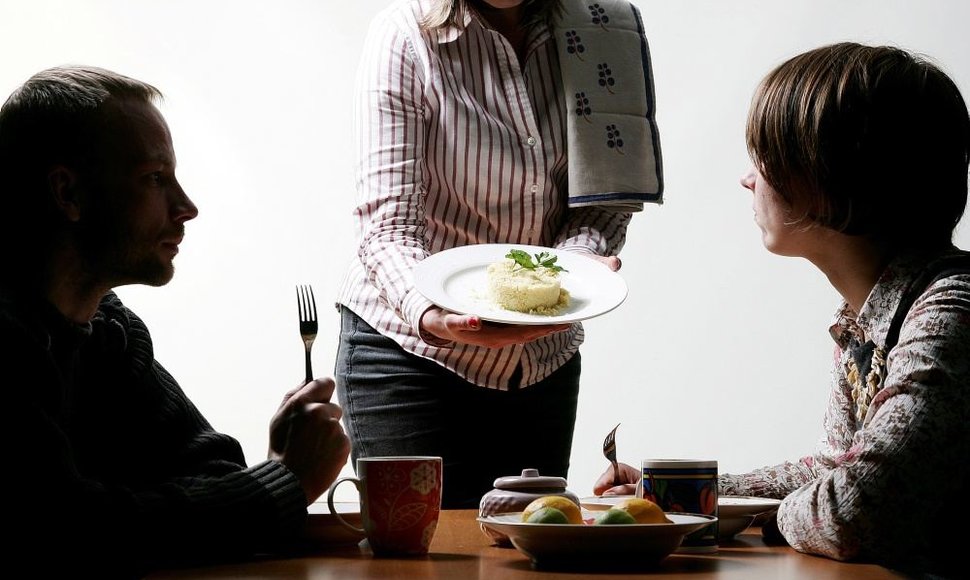A friend recently asked what was the minimum sum on which I could support myself for one month. I said I could do with 800 litas (232 euro) – the current minimum wages in the country. Granted, I added a number of special clauses: I would need to live in my own apartment without mortgage payments, I would have to give up a car, various obligations to banks and insurance companies. Curiosity made me put my money where my mouth was and see if my optimism was not misguided.
Snub from a beggar
I start the experiment on 1 May. It is a bank holiday in Lithuania, so I could lock myself at home, nibble at old biscuits and tea, and save money. Instead, however, I hit the town to meet some friends in a café to share our holiday plans. Half a pot of mint tea set me back 3 litas.
After the second and completely dry day I splash out a little: an ironing board (something I desperately needed for some time and they are offering a discount), a bag-full of oranges (also with special offer – I feel lucky today!), and a kilo of apples relieve my wallet of 65.56. Some culture in the evening – I'm going to cinema, having found a forgotten free ticket. On my way out, unfortunately, I drop by in a beauty shop (darn those mall-housed cinemas) and wave goodbye to 16.6.
On the following morning, a friend invites me for tee (it's on him). Day six, a visit to a used book store, to get a book I've reserved before. I leave the store carrying three (23 litas – I would have paid much more, had I not used promotion points to pay for them). In the supermarket, I grab a juice maker (discount!), but discover at the counter that the offer applies only to something else that I don't even know the use for, so I return the appliance without much regret. I soon come to appreciate my decision, since my account appears to contain much less money than I thought.
At the parking lot, I am greeted by an extended hand: a middle-aged man asks for money for food. While I fish for cent coins in my pocket (I will need the litas coins myself), he brags about having “collected 8 litas yesterday and bought some soup” (darn me, must have been a gourmet soup for that price). I pour about 30 cents into his palm only to be reproached: “This won't be enough even for bread!” While I ponder what to reply, he rushes to another driver.
Budget exceeded
Several following days pass without any expenses (that's a little self-deceiving – my bank accounts are relieved of sums of money I owe for my car lease, life insurance, and other services I'm paying for with direct debit) after which I set out on a big weekend shopping.
I leave 11.55 in a supermarket (don't laugh – I usually spend at least twice as much, but I'm on a budget today), another 4.5 find their place in the farmers' market.
Sometime in the middle of the month, I reluctantly pay the car parking fee – after all, paying a fine would set me back much more. I transfer another 92.7 litas for utilities. How fortunate that it is not winter – the bills would be twice or thrice bigger.
Meeting a buddy on s sunny weekend afternoon, I cannot resist a cone of ice-cream – 5.5 litas. The following day, another friend talks me into trying out a new ice-cream place. Well, a synthetic-flavoured and cosmic-coloured dessert is certainly not worth 6.4 litas. I start my car and a warning light starts flashing behind the steering wheel – a visit to a gas station follows (240.96).
I count six grocery shoppings the following week, since I keep running out of something essential. The final toll stands at 58.05. Costly – I would have done better, had I stuck to my usual one weekly trip to the supermarket. I treat myself with ice-cream several times, yet at another occasion I leave the store having paid no more than 54 cents, for a few carrots.
On the last day of the month, the valet suffers another visit to a supermarket and a chemist's, 45.31 in total. Well, time to tally up the monthly expenses – 897.64 litas. I have exceeded the budget, yet with a little extra effort, I could have easily made it, perhaps even fitting into 670 litas – the minimum wages minus taxes. The final sum excludes mortgage, since if I were in fact living on minimum wages, I couldn't afford a loan and would probably be living for free at my parents'.
How did I make it?
I wasn't prepared and stocked up before I started the experiment – I hate canned food and soups from powder, while my parents do not keep a magic basement stocked with last year's garden goods. However, I do not buy meat – which would have taken its toll on my budget – and I try to make my own food.
However, life is far less jolly when you have to scrub and save. Wave bye-bye to entertainment and inessential yet pleasant expenses like books, cafés, weekend trips, etc.
Moreover, for a person living on minimum wages, words like “ecological” or “healthy food” sound like distant exoticisms.
Several years ago, I tried comparing prices of regular products and those labelled with “eco-,” “bio-,” or “natural-” prefixed words. Ecological fruit, vegetables, bread, dairy, meat, drinks, flour, cosmetics, sweets, etc. cost me about two and a half times more (800 litas instead of 300). Obviously, economy and ecology don't go together.
So unless you have parents or relatives from the country to support you with home-grown fruit, vegetables, milk, and meat, your stomach will have to toughen up for a less-than-healthy diet.
Reining in on spending
How do you avoid unnecessary spending and tighten up the unavoidable?
A rule of thumb is to avoid shops during sale season, since that's when in addition to things you need, you bring home a variety of so-cheap-I-couldn't-not-buy ones.
On the other hand, sales and special offers can help save. Supermarkets often offer discounts on products you need anyway (groats, oil, cleansers, toiletries) or more expensive things you want (bicycles, electronics, clothes). All you need is to make a list of stuff you need and then wait for them to be discounted.
It is a good idea to buy all you need in fewer shopping visits. Going to a shop once a week creates fewer occasions for unplanned spending. Using cash also helps rein in on spending – holding actual notes in your hand makes you literally see how much you spend. Besides, parting with a banknote is psychologically more demanding than entering a PIN code.
Lunch in town is something to treat yourself on weekends, not every day. Making food at home helps put control not only on your expenses (I bought 3 kilos of oranges in the beginning of the month for 6 litas – I would have paid as much for a glass of orange juice in a café) but also on your diet.
Saving does not mean you have to give up on your social life. You can still meet your friends and relatives, but don't do it in a pub. A better idea is to have a house get-together with everyone bringing snacks.
Up to 850
The Lithuanian Government and labour unions have failed to find an agreement on how much to raise the minimum monthly wages (MMW).
In protest against the Government's unwillingness to negotiate, labour unionists boycotted a Tripartite Council meeting called to discuss the raise. So the Government announced they would stick to a decision previously adopted at the Tripartite Council to increase the minimum wages, but do it gradually.
The Government decided to up MMW by 50 litas, to 850 (246 euro), starting in August. If economy is in a good shape, additional 50 litas are to be added to MMW in January 2013. Labour unions, on the other hand, demanded to increase minimum wages to 900 litas in July.













